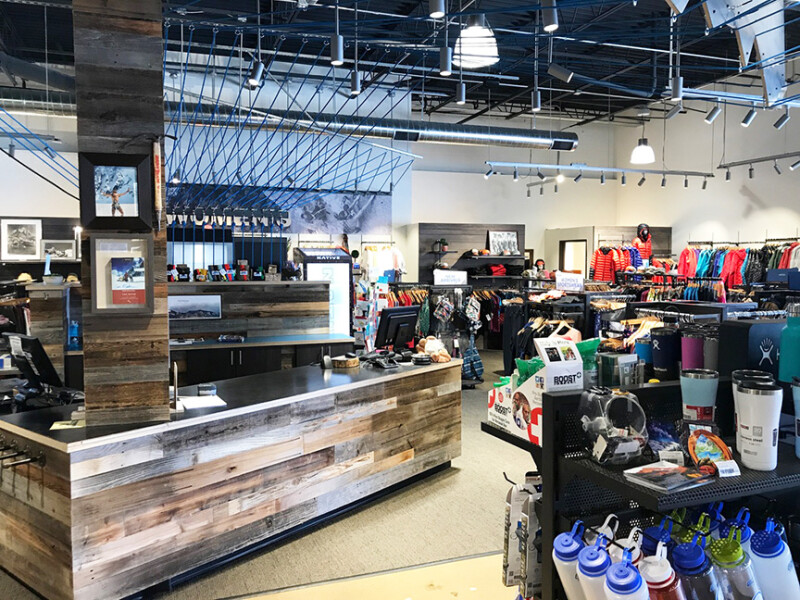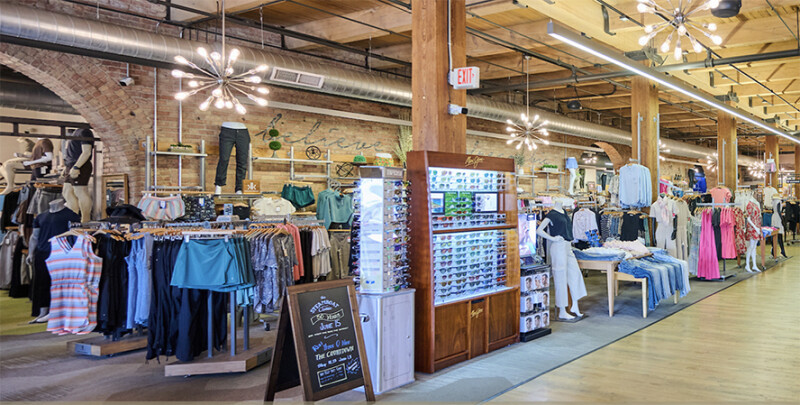Athough Scarpa is becoming increasingly vocal about its environmental chops, the family-owned outdoors brand isn’t simply paying lip service to sustainability.
No, Scarpa is actively working to be a positive environmental steward from product development to manufacturing to events, right down to foregoing the traditional – and eventually discarded – trade show booth at The Running Event in favor of a mobile showroom.
Across its product lineup, Scarpa is incorporating more earth-friendly materials. Every component of its Spin Planet trail running shoe, for instance, features some percentage of recycled content: 100 percent in the upper, 45 percent in the midsole and 30 percent in the outsole.
At the company’s facilities in Italy, 100 percent of the electricity comes from certified renewable sources, including low-impact plant biomass. This enables Scarpa, a company on the cusp of earning B Corp Certification, to offset approximately 1000 tons of carbon dioxide each year.
At its Asolo, Italy, headquarters, meanwhile, all staff have received training on sustainable innovation, while a group of 16 Sustainability Ambassadors spread across every department are available to answer employee questions about sustainability issues.
“Our efforts are a very small step in helping to protect the environments where our are products are used,” says Melanie Hood, marketing and communication director of Scarpa North America.
Scarpa is among many brands paying greater focus to sustainability. From eco-conscious products to environmentally friendly operations to ecologically minded initiatives, brands across the running and outdoor space are making sustainability a greater priority.
Embracing Sustainability
Two years ago, Brooks launched its first carbon-neutral running shoe with the Ghost 14. For Brooks, which aims to be net-zero carbon by 2040, the updated Ghost represented another step toward reaching that ambitious goal.
And its momentum hasn’t stalled since.
Last September, Brooks introduced the Green Silence Ghost 15, in which processes such as dope dyeing reduced water use by 94 percent and greenhouse gas emissions by 92 percent. In addition, Brooks unveiled a new outsole comprised of 20 percent recycled silica content. By 2030, the brand plans to incorporate at least 50 percent recycled or bio-based content in all of its product materials.
Other entrenched footwear brands are also chasing more eco-friendly performance running shoe models.
Mizuno’s ballyhooed Wave Rider 27 features more than 90 percent recycled content on its upper body textile, upper body lining textile and sockliner lining. For good measure, the Wave Rider 27 also tosses in a plant-based Wave plate. The Wave Horizon 7 and Wave Sky 6 similarly feature majority recycled content on their uppers.
Saucony captured rave reviews last fall with its Triumph RFG, an eco-friendly version of its popular high-cushioned daily trainer. Gear review website Believe in the Run labeled the model a “Jolly Green Triumph” for its ability to go green without sacrificing performance. A vegan style with recycled materials, the Triumph RFG combines plant-based dyes in the upper with a 55 percent corn-based PWRRUN BIO+ foam midsole limiting dependence on plastic.
(It’s worth noting Saucony’s eco efforts extend beyond performance running footwear. In February, the Boston-based brand released a limited-edition Grid Shadow 2 collaboration with streetwear brand Bodega called the Jaunt Woven. The earth-tone colored model features a recycled gum rubber outsole alongside a recycled mesh tongue, collar liner and footbed.)
Friends of the Earth
Given the negative environmental impacts of footwear throughout its life cycle, from greenhouse gases emitted through manufacturing to the millions of shoes sitting in landfills, footwear players continue seeking ways – big and small – to deliver more environmentally friendly options.
Xero Shoes crafted its new zero-drop Zelen road running model with upper mesh, lining and laces made from rPET recycled materials, while Mammut’s new Sertig TR Low trail running shoe is 100 percent decarbonized. Mammut also chose recycled materials for the Sertig to promote a more circular economy and swapped non-biodegradable fabric treatments with more sustainable alternatives.
French brand Veja places sustainability at the center of its universe, a reality particularly evident in the Condor 3 that debuted on March 28. Lightweight with high-end shock absorption, the third iteration of Veja’s flagship running shoe includes numerous bio-based materials, including an engineered mesh upper comprised of 100 percent recycled polyester and a 43 percent sugar cane-based EVA midsole.
Then there’s Salomon, which proudly calls itself “the sole provider of a fully recyclable shoe in the market” with its Index.03. The shoe features two distinctive parts marked by a red line circling the shoe: a TPU lower section that is repurposed for ski boots and a polyester upper reincarnated into fabrics. To return the shoes to Salomon for disassembly, users simply scan a QR code on the tongue, register their shoe and grab a free shipping label online.
Erin Cooper, senior marketing manager for run and outdoor at Salomon North America, describes the Index.03 as “a north star in product sustainability” for the brand and says each iteration of the Index has sought heightened sustainability without sacrificing performance — an admittedly “delicate balance.”
“The key for us is to always approach sustainability with a curiosity mindset to see what is possible,” Cooper says.
Green Beyond Shoes
Sustainable products, of course, are not limited to footwear. Apparel and accessory brands are also contributing to the sustainability surge in run specialty.
Gorewear’s new Concurve Running Jacket, for instance, uses Gore’s new expanded Polyethylene (ePE) membrane. While still providing the traditional benefits of Gore-Tex products – waterproof, windproof and breathable – the ePE membrane eliminates the use of harmful PFCs and also boasts a reduced carbon footprint achieved by its lower material mass and new material combination.
Swedish apparel company Houdini Sportswear continues bringing circularity front and center by developing durable, earth-friendly products. In its most recent Fall/Winter collection, Houdini only used recycled, recyclable, renewable, biodegradable or bluesign-certified fabrics. Before putting any item into production, the company consults its own design checklist, which poses questions about versatility, durability, construction and a potential end-of-life solution.
On the eyewear side, Tifosi Optics has developed a plant-based frame technology called Thrive, which is composed of 45 percent renewable raw materials derived from castor oil. Tifosi founder Joe Earley says the Thrive material will become more commonplace across the company’s product lineup in the coming months, including in its popular Swank series.
“We listen to consumer and customer feedback, which has indicated that a focus on environmental improvement or reducing our impact is important,” Earley says.
Looking Inward
While brands can certainly pursue sustainability on the product side, it’s far from the only way they are chasing environmental goals. Efforts on the corporate side, in areas like operations and packaging, are also helping brands reduce their environmental footprint.
In 2015, Houdini launched a Planetary Boundaries initiative and began collaborating with earth system scientists from the Stockholm Resilience Centre. With the initiative, Houdini studies nine different aspects of its environmental impact, including climate change, fresh water use and biosphere integrity to propel its progress.
Upstart sock brand Jogology, founded by run specialty veterans Tanya and Bert Pictor and Luke Rowe, has put sustainability front and center from the onset. The not-yet-one-year-old brand eschews plastic in its packaging and shipping and uses 80 percent post-consumer waste board in its packaging.
And Polartec, which invented the first fleece crafted from recycled plastic water bottles some 30 years ago, recently unveiled its Beyond Begins Today initiative. Building upon Polartec’s existing use of recycled and plant-based materials and certified waste reduction activities, Beyond Begins Today includes static and multimedia content to advance the narrative around sustainability as well as a promise that every new product launching in 2024 will either reduce Polartec’s impact on the planet, endure the test of time or contribute to the circularity processes. Polartec technologies are used in products from brands such as Patagonia, Arc’teryx and Salewa.
Last July, Balega became Climate Neutral Certified, the end of a nearly two-year process in which the Implus-owned sock brand committed to measuring its climate impact in manufacturing and business operations, setting reduction targets and offsetting its carbon emissions. Implus senior VP–global category and brand development Ryan Green says Balega will continue working on improvements.
“Climate Neutral Certification is part of a larger commitment and it is important,” Green says. “We believe sustainability and our social responsibility are critical to our shared future and that building superior products means building ethical and sustainable products.”
Outdoor Research, an established brand pushing more into the running category, is a founding member of the Climate Action Corps, a collection of companies committed to reducing greenhouse gas emissions and sharing their measurable progress annually. In addition to phasing out PFAs – the so-called “forever chemicals” – Outdoor Research continues developing climate action plans and using renewable energy.
And upon its founding 2022, footwear brand NNormal joined 1% for the Planet, an organization whose member businesses commit to donating one percent of their top-line revenue to environmental partners. NNormal’s partner is the Kilian Jornet Foundation, which promotes mountain preservation through research, education and community activities.
“We have always thought that companies have a significant role to play in social responsibility and we wanted NNormal to be part of that commitment from the get-go,” NNormal CEO Sito Luis Salas says of the brand’s participation in 1% for the Planet. “We believe all actions should be undertaken with a commitment … and the environmental preservation is for sure our big one.”







